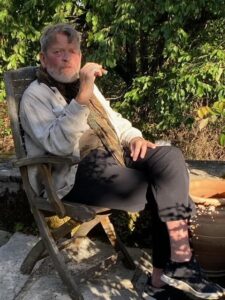Radio signals and a ‘fatal flapper’
Mr. Good-Evening
by John MacLachlan Gray
Madeira Park: Douglas & McIntyre, 2024
$34.94 / 9781771623957
Reviewed by W.H. New
*

Mr. Good-Evening is a delight. The final volume of John MacLachlan Gray’s ‘Vancouver trilogy’ (after White Angel and Vile Spirits), this novel will appeal especially to those who are fond of mysteries and who appreciate sardonic glimpses of what life was like in Vancouver in the early twenthieth century. I think it’s a wonderful read.
Packed with the usual stuff of the detective genre, Mr. Good-Evening offers a few twists to keep readers alert. There’s a murder (or three), an innocent victim (and one or two whose innocence is in doubt), a solid cop (and some figures who are less than respectable). And along with this familiar mix of figures, Gray works in a few historical characters (Winston Churchill for one, and at least in the narrative shadows, Al Capone is another).
There’s also a whole host of lookalikes in the book—figures not necessarily based on real life but at least similar if you know your BC history. Brother Osiris, for example. He’s a glib speaker who collects money and acolytes for his self-styled Aquarian Foundation; and with Madam Zura he wields both physical and astral power on De Courcy Island. (He conjures “Dark Adepts,” or so at least his fearful followers believe.) Brother Osiris will be familiar to readers who have heard of a figure in BC history by the name of Brother Twelve who had a collaborator named Madam Zee.
There are also enough references in this book to political and judicial figures and events in BC in the 1920s to establish a solid Vancouver basis for the story: people and places (Doukhobors, the KKK, Hogan’s Alley), commercial enterprises (Spencers, the CPR, Notte’s pastries, the Lumberman’s Club), and domestic products (Zane Grey, Sweet Caps, Whitmans’ Sampler, clove oil, Photoplay). Even As a Man Thinketh, a booklet of moral advice that was commonly consulted in earnest homes at the time, makes a repeat appearance here—its resonance providing an ironic counterpoint to the skewed behaviour of the characters themselves.

Gray’s characters include Dora Decker, the “fatal flapper,” who is the first suspect; Mildred Wickstrom, a landlady who for reasons of her own comes to Dora’s defence; Insp. Calvin Hook, the good cop, who along with Sgt. Quam will encounter pressures on many sides; several not-so-good cops who get in the way; some dubious business tycoons; the uneasy acolytes of Brother Osiris, with a bundle of uncertainties and an equal number of fears; and, oh yes, Churchill, who for a long time I thought was a throwaway gimmick but who shows up by train and performs a necessary function in the narrative.
(History tells us that Churchill did indeed tour the West Coast in 1929; he spoke in New Westminster, and took time out from politicking to paint a picture while sitting atop Grouse Mountain: this Grouse Mountain painting, I have since learned, sold recently in Calgary for $87,000, though that mini-fact is irrelevant to the plot of Mr. Good-Evening.)
Which brings me to the central plot. I won’t unravel it here, leaving the details of the mystery for readers to discover for themselves. All that is necessary to know in advance is that the late ’20s—am era of North American gamblers, drugs, bootleggers, bribery, political chicanery, and street violence—was also the time when radio arrived in Vancouver. And while some people had their doubts about this new technology, many others were ready to profit by it. CN Rail, for instance, ran the local news.
When business strategy requires a straight-shooting newspaper reporter to be an on-air persona, Ed McCurdy is hired. He has a print reputation. And a mellifluous voice. People listen to him four times a week with the same attention that they give to his articles in the paper press. But what does he report? News? Gossip? Not uncharacteristically, the on-air reporter does not investigate the news so much as he reads the script that is placed before him. Hilarity ensues when the less-than-cooperative staff at the station prearrange ‘news’ items in unrelated, tongue-twisting, rushing sequences that will cause him to stumble. Something sinister happens too.
On his own bat, McCurdy chooses to end every broadcast with some variant of the phrase “I wish you a restful good evening,” which soon becomes his community nickname and provides Gray with his title. Inevitably, McCurdy becomes involved in the city’s disruptions: the murders, the politics, the ready reliance on gossip. His semi-nightly broadcast is received as fact (just as gossip is also so often accepted). It is also heard by people who vigorously correct what they perceive to be his errors in pronunciation. And at the Aquarian Foundation, the people who hear his voice emanating out of an apparent void—as only Osiris controls “reception”—assume Mr. Good-Evening to be a Dark Adept with nefarious intent.
As is characteristic of mysteries, these various threads all come together to deal satisfactorily with the dilemmas that surfaced at the outset. They provide perspective on some other issues as well. I say perspective, not resolution, because not all the social issues that the novel alludes to can perhaps ever be solved, even in fiction. Not in 1929, a year when authorities were inaccurately predicting unabated economic growth. And not now. So I am not likely to be the only reader who will see in the novel some inferential parallels between 1929 and 2024.
I think Mr. Good-Evening is animated and sharp. I also think the novel depends for its interest less on the central murder mystery than on the social context that Gray brings to life—engagingly, even when street details are cautionary. The story is fast-paced. The language is clever throughout, the tone wonderfully wry, and the characters have distinct personalities. You’ll swear you know them, or know somebody’s cousin’s sister-in-law who for sure does know them: you know where they shop and how they cope with toothache, it feels that immediate.
For the mystery fan, this is great fun. And for those who are Vancouver social history buffs, this book is a treat.
*

W.H. (William) New has written five books for children, including The Year I Was Grounded (Tradewind, 2009), and he has written widely on short fiction in Canada, Australasia, and elsewhere. His most recent books include Neighbours (2017) and In the Plague Year (2021), reviewed here by Gary Geddes. [Editor’s note: William New has reviewed books by Astrid Blodgett, Danial Neil, Yasuko Thanh, Carrie Mac, Corinna Chong, Robert Chursinoff, Harold Macy, Paul Sunga, Emily St. John Mandel, and Tamas Dobozy for BCR.]
*
The British Columbia Review
Interim Editors, 2023-25: Trevor Marc Hughes (non-fiction), Brett Josef Grubisic (fiction)
Publisher: Richard Mackie
Formerly The Ormsby Review, The British Columbia Review is an online book review and journal service for BC writers and readers. The Advisory Board now consists of Jean Barman, Wade Davis, Robin Fisher, Barry Gough, Hugh Johnston, Kathy Mezei, Patricia Roy, Maria Tippett, and Graeme Wynn. Provincial Government Patron (since September 2018): Creative BC. Honorary Patron: Yosef Wosk. Scholarly Patron: SFU Graduate Liberal Studies. The British Columbia Review was founded in 2016 by Richard Mackie and Alan Twigg.
“Only connect.” – E.M. Forster